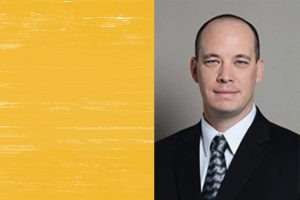
July 5, 2023
NSF award allows for adoption of advanced computing, data resources
A Mizzou Engineer is leading a project to improve access to research and educational computing resources needed to take advantage of artificial intelligence and machine learning (AI/ML).
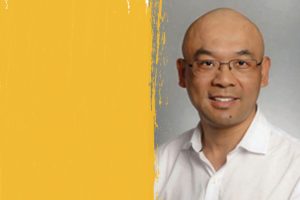
May 23, 2023
Cheng developing software to predict protein function using generative AI
A Mizzou Engineer has received funding from the National Science Foundation to develop a tool that will predict how a protein functions based on its order of amino acids. Jianlin “Jack” Cheng envisions developing open source software that would allow a user to enter the sequence, then the system would predict not only how that string of amino acids will form into a structure but also the role it will carry out within a cell. Additionally, the system would pinpoint the specific site of the protein that carries out the function.
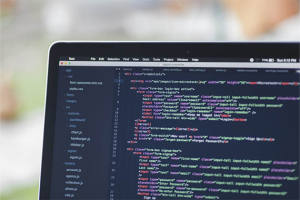
April 26, 2023
$1.6 million grant awarded to develop open source software toolkit
Nearly all consumer electronics found in homes and offices — from computers to smartphones — include some type of open-source software (OSS), a fundamental part of a computer program that anyone has access to modify it. OSS has gained in popularity in recent years because of the cost-savings it provides companies across the tech industry, said Sean Goggins, professor in the Department of Electrical Engineering and Computer Science.
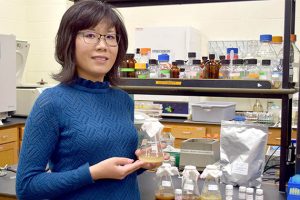
March 10, 2023
Mizzou Engineering researcher helps turn food wastes into biodegradable plastics
A Mizzou Engineer is helping researchers at Virginia Tech develop a process to convert food wastes into biodegradable plastics. Caixia “Ellen” Wan is an associate professor of chemical and biomedical Engineering and a bioprocess engineer. She’s part of a team that received a $2.4 million grant from the U.S. Department of Agriculture (USDA) to upscale bioplastic production with the goal of replacing petroleum-based plastics while also keeping leftovers out of landfills.
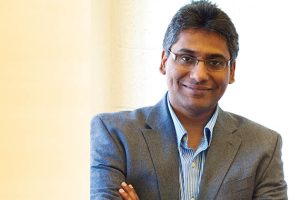
March 6, 2023
Calyam, collaborators using AI to assist local news organizations
Each day, local newsrooms across the United States are inundated with a myriad of press releases and story pitches competing for attention from a staff already strapped for time. Prasad Calyam, a professor of electrical engineering and computer science, and his team are among an elite group of researchers working to integrate automation and artificial intelligence to help local news organizations solve this challenge and others.

Jan. 13, 2023
Mizzou Engineer leading NSF Convergence Accelerator project to ensure food safety
A Mizzou Engineer is leading a team to develop new technologies that will quickly detect foodborne pathogens with the goal of improving food safety, especially among lower socioeconomic communities.
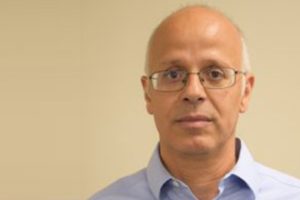
Jan. 11, 2023
Team using artificial intelligence to revolutionize infrared sensors
With funding from the U.S. Army, a Mizzou Engineering team and collaborators are using artificial intelligence in hopes of revolutionizing infrared sensors.
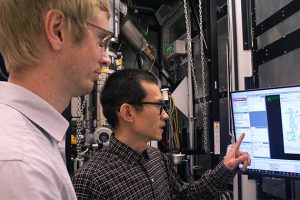
Sep. 27, 2022
In pursuit of better lithium-ion batteries
MU researchers Matthias J. Young (left) and Xiaoqing He are using a $500,000 grant from NSF to explore a key technical challenge preventing lithium-ion batteries from achieving optimal energy performance. By Eric Stann | MU News Bureau From personal electronics to electric vehicles, lithium-ion batteries are used in many technologies today. Over the last 30 years, scientists have worked to improve the overall safety and performance of these batteries by converting a key component, called electrolytes, from liquid to solid — partly due to an issue of the liquid being flammable. Yet, while solid-state lithium-ion batteries — using solid electrolytes…
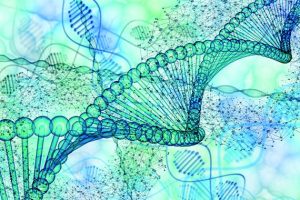
June 6, 2022
Researcher continues work to decode genome sequences
In the future, hospitals and clinics may be able to better manage diseases by pinpointing exactly how an individual’s body will respond to treatment. But first, they need a fast, efficient and secure way to analyze DNA, or human genome sequences. Enter Praveen Rao, an associate professor with joint appointments in Health Management & Informatics and Electrical Engineering & Computer Science. Rao has spent the past two years developing a software system for others to analyze and compare genomes more easily. Now, he has a two-year grant from the National Science Foundation (NSF) to expand upon that work.

May 23, 2022
Engineer develops underwater imaging system to investigate natural seeps
A still image from Binbin Wang’s research into natural seeps. It’s estimated that roughly 160,000 tons of oil and gas naturally enter North American waters each year. These so-called “natural seeps” are hydrocarbons that come out of plant or animal fossils under the seafloor. Depending on where they are, the bubbles of oil and gas can dissipate or, in more shallow spots, rise to the surface, sending methane into the atmosphere. But how do they behave and impact surrounding water at the point they arise from the ocean floor? That’s what Binbin Wang hopes to find out. Wang, an…
- « Previous
- 1
- 2
- 3
- 4
- Next »